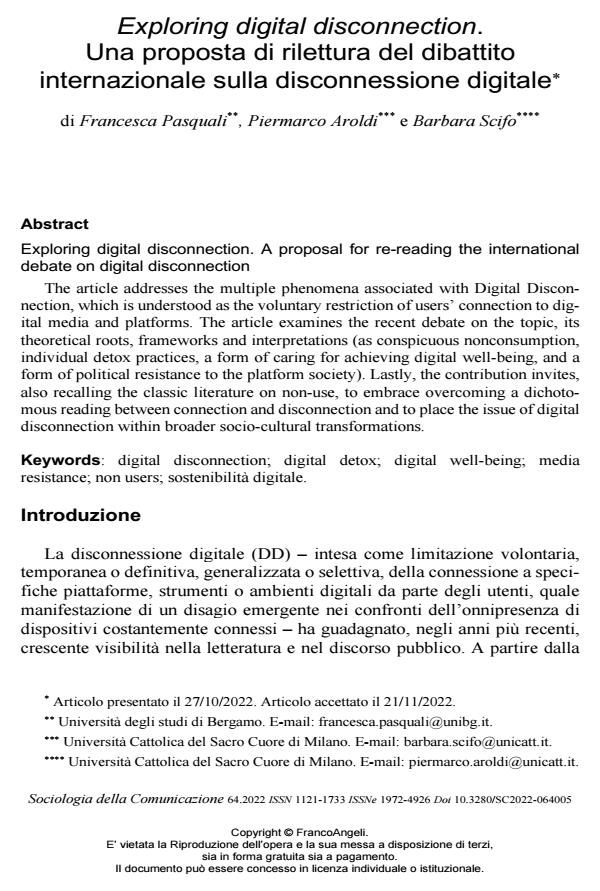Exploring digital disconnection. A proposal for re-reading the international debate on digital disconnection
Journal title SOCIOLOGIA DELLA COMUNICAZIONE
Author/s Francesca Pasquali, Piermarco Aroldi, Barbara Scifo
Publishing Year 2023 Issue 2022/64
Language Italian Pages 18 P. 80-97 File size 302 KB
DOI 10.3280/SC2022-064005
DOI is like a bar code for intellectual property: to have more infomation
click here
Below, you can see the article first page
If you want to buy this article in PDF format, you can do it, following the instructions to buy download credits

FrancoAngeli is member of Publishers International Linking Association, Inc (PILA), a not-for-profit association which run the CrossRef service enabling links to and from online scholarly content.
The article addresses the multiple phenomena associated with Digital Disconnection, which is understood as the voluntary restriction of users’ connection to digital media and platforms. The article examines the recent debate on the topic, its theoretical roots, frameworks and interpretations (as conspicuous nonconsumption, individual detox practices, a form of caring for achieving digital well-being, and a form of political resistance to the platform society). Lastly, the contribution invites, also recalling the classic literature on non-use, to embrace overcoming a dichotomous reading between connection and disconnection and to place the issue of digital disconnection within broader socio-cultural transformations.
Keywords: digital disconnection; digital detox; digital well-being; media resistan-ce; non users; sostenibilità digitale.
- Per una fenomenologia della disconnessione digitale in Italia. Pratiche, motivazioni, ostacoli Piermarco Aroldi, Francesca Pasquali, Barbara Scifo, in SOCIOLOGIA DELLA COMUNICAZIONE 69/2025 pp.5
DOI: 10.3280/SC2025-069001 - Genitori zerosei anni e tecnologie tra percezione d’uso e datificazione: i trend nei Rapporti Cisf 2017, 2019, 2022 e 2024 Stefano Pasta, Marco Rondonotti, in Media Education /2025 pp.11
DOI: 10.36253/me-17306
Francesca Pasquali, Piermarco Aroldi, Barbara Scifo, Exploring digital disconnection. Una proposta di rilettura del dibattito internazionale sulla disconnessione digitale in "SOCIOLOGIA DELLA COMUNICAZIONE " 64/2022, pp 80-97, DOI: 10.3280/SC2022-064005